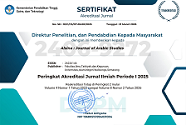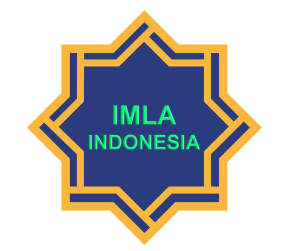Optimizing Arabic Listening Skills: A Systematic Review and the Proposal of an Integrated Suggestopedic Brain-Based Learning (ISBBL) Model
DOI:
https://doi.org/10.21580/alsina.7.2.27815Keywords:
Arabic listening skills, Brain-Based Learning, ISBBL model, suggestopedia, systematic literature reviewAbstract
Proficiency in Arabic listening skills is often hindered by significant psychological barriers, such as foreign language anxiety. This study aims to address this challenge by developing a coherent pedagogical framework that integrates the affective strategies of Georgi Lozanov's Suggestopedia with the neuroscientific principles of Brain-Based Learning (BBL). A Systematic Literature Review (SLR) was conducted following PRISMA guidelines. The process began with the identification of 205 records from academic databases, which were then screened to yield a final corpus of 36 core articles for thematic synthesis. This synthesis focused on literature pertaining to Suggestopedia, Brain-Based Learning (BBL), and listening acquisition. The analysis revealed profound synergies between Suggestopedia's techniques (e.g., concert sessions) and BBL's core principles (e.g., relaxed alertness, emotional engagement). This synthesis resulted in the formulation of the Integrated Suggestopedic Brain-Based Learning (ISBBL) model—a novel, five-phase conceptual framework proposed to systematically guide learners from high anxiety to a state of relaxed, active engagement. The ISBBL model offers a practical framework for educators. While it awaits empirical validation, the model conceptually grounds the intuitive methods of Suggestopedia in the principles of educational neuroscience. This framework presents a structured approach to overcoming affective barriers in Arabic listening instruction and is recommended for further empirical research to validate its classroom efficacy.
Downloads
References
Agung, Nur. “Peningkatan Kemampuan Debat Bahasa Arab Mahasiswa Melalui Metode Suggestopedia.” Naskhi: Jurnal Kajian Pendidikan Dan Bahasa Arab 2, no. 1 (2020). https://journal.uiad.ac.id/index.php/naskhi/article/view/288/203.
Akalin, Suna. “The Discourse in Mrs. Dalloway by Virginia Woolf and Foreign Language Teaching: The Decline of Language Learner Anxiety by the Usage of Hedges, Particular Modals and Adverbs as in the Usage of These Structures in Mrs. Dalloway for a Specific Purpose.” Procedia - Social and Behavioral Sciences 174 (February 2015): 3049–54. https://doi.org/10.1016/j.sbspro.2015.01.1097.
Alanazi, F H. “Brain-Based Learning as Perceived by Saudi Teachers and Its Effect on Chemistry Achievement of 7th Graders.” Journal of Baltic Science Education 19, no. 6 (2020): 864–74. https://doi.org/10.33225/jbse/20.19.864.
Alavi, Sayyed Mohammad, and Fatemeh Esmaeilifard. “The Effect of Emotional Scaffolding on Language Achievement and Willingness to Communicate by Providing Recast.” Cogent Psychology 8, no. 1 (2021). https://doi.org/10.1080/23311908.2021.1911093.
Al-Balushi, K A, and S M Al-Balushi. “Effectiveness of Brain-Based Learning for Grade Eight Students’ Direct and Postponed Retention in Science.” International Journal of Instruction 11, no. 3 (2018): 525–38. https://doi.org/10.12973/iji.2018.11336a.
Aldhaheri, Talal A., Sonali B. Kulkarni, Pratibha R. Bhise, and Baraq Ghaleb. “Investigation of Brain Response to Acquisition and Learning the Second Languages Based on EEG Signals and Machine Learning Techniques.” Cogent Arts and Humanities 11, no. 1 (2024): 2416759. https://doi.org/10.1080/23311983.2024.2416759.
Aziz, Zahara, and Suria Baba. “Instructional Leadership Enhanced Creativity in Smart Classroom Activities.” Procedia - Social and Behavioral Sciences 15 (2011): 1566–72. https://doi.org/10.1016/j.sbspro.2011.03.332.
Bandara, Wasana, and Rehan Syed. “The Role of a Protocol in a Systematic Literature Review.” Journal of Decision Systems, ahead of print, Taylor & Francis, October 1, 2024. https://doi.org/10.1080/12460125.2023.2217567.
Bernabe, Claire, Denielle Erika Delos Reyes, Mica Mae Languido, Rasabelle Ulnagan, Rockangel Jamoral, and Novalyn Vidal. The Impact of Suggestopedia Method to Enhance the Listening Skills of the Grade 8 Students. 2024. https://doi.org/10.2139/SSRN.4892053.
Bora, F. Duygu. “The Impact of Emotional Intelligence on Developing Speaking Skills: From Brain-Based Perspective.” Procedia - Social and Behavioral Sciences 46 (2012): 2094–98. https://doi.org/10.1016/j.sbspro.2012.05.434.
Colliander, Helena, and Andreas Fejes. “The Re-Emergence of Suggestopedia: Teaching a Second Language to Adult Migrants in Sweden.” Language, Culture and Curriculum 34, no. 1 (2021): 51–64. https://doi.org/10.1080/07908318.2020.1767643.
Dalimunthe, Nurul Khoirunnisa, and Rahmaini Rahmaini. “Media Pembelajaran Berbasis Game Gambar Berangkai Dalam Pembelajaran Mahārah Istimāʿ.” Jurnal Educatio FKIP UNMA 9, no. 3 (2023): 1378–85. https://doi.org/10.31949/EDUCATIO.V9I3.5539.
Fatemipour, Hamidreza. “Peripheral Learning of English Language: A Comparison Between ESL and EFL Contexts Provided for University Students.” Procedia - Social and Behavioral Sciences 93 (October 2013): 1394–97. https://doi.org/10.1016/j.sbspro.2013.10.050.
Grospietsch, F, and I Lins. “Review on the Prevalence and Persistence of Neuromyths in Education – Where We Stand and What Is Still Needed.” Frontiers in Education 6 (2021). https://doi.org/10.3389/feduc.2021.665752.
Guan, Wenyi, Dan Hong, Lihua Zhao, Bermet Ibraeva, and Bermet Ryskulova. “GTM in New Era: A Reflection on Its Development and Integration with Other Teaching Methods.” Scientific Herald of Uzhhorod University. Series Physics, no. 55 (2024): 2777–85. https://doi.org/10.54919/physics/55.2024.277ud7.
Güngenci, Meryem Melike, and Musa Yildiz. “Challenges in Listening and Speaking Skills for Arabic Language Pre-Service Teachers: A Correlational Study.” Novitas-Royal 18, no. 2 (2024): 104–16. https://doi.org/10.5281/ZENODO.13860910.
Haghighi, Maryam. “The Effect of Brain- Based Learning on Iranian EFL Learners’ Achievement and Retention.” Procedia - Social and Behavioral Sciences 70 (January 2013): 508–16. https://doi.org/10.1016/j.sbspro.2013.01.088.
Hamidah and Marsiah. “Pembelajaran Maharah Al-Istima’ Dengan Memanfaatkan Media Youtube: Problematika Dan Solusi.” Al-Ta’rib : Jurnal Ilmiah Program Studi Pendidikan Bahasa Arab IAIN Palangka Raya 8, no. 2 (2020): 147–60. https://doi.org/10.23971/ALTARIB.V8I2.2282.
Harden, V, and V N Jones. “Applying the Principles of Brain-Based Learning in Social Work Education.” Advances in Social Work 22, no. 1 (2022): 145–62. https://doi.org/10.18060/25142.
Hashemi, Masoud. “Language Stress and Anxiety among the English Language Learners.” Procedia - Social and Behavioral Sciences 30 (2011): 1811–16. https://doi.org/10.1016/j.sbspro.2011.10.349.
Humeniuk, I, O Prokopova, O Maksymets, and A Polishchuk. “Language Acquisition for ESP Students with Suggestopedia Method Application.” Engineering for Rural Development 22 (2023): 38–44. https://doi.org/10.22616/ERDev.2023.22.TF006.
Hwaider, Shimaa M. “Problems of Teaching the Listening Skill to Yemeni EFL Learners.” International Journal of Scientific and Research Publications 7, no. 6 (2017): 140–48.
Ikraama, Niswa, and Maslamah Maslamah. “Taṭwīr Al-Wasā’il al-Taʿlīmīyah ‘Al-Podcast al-ʿArabī’ Li-Taḥsīn Mahārat al-Istimāʿ al-ʿArabīyah Li-Ṭalabat al-Madrasah al-Mutawassiṭah al-Islāmīyah.” Alsina : Journal of Arabic Studies 5, no. 1 (2023): 29–52. https://doi.org/10.21580/alsina.5.1.20204.
Imawan, Yuli, Madah Rahmatan, Irfan Hania, and Alimudin Alimudin. “Ashwat’s Teaching Strategies and Their Implications In The Learning of Mahārah Istimāʿ.” International Journal of Education and Teaching Zone 2, no. 1 (2023): 13–24. https://doi.org/10.57092/IJETZ.V2I1.55.
Ismail, Ismail, Miftachul Taubah, and Syarifuddin Syarifuddin. “Efektivitas Metode Suggestopedia Dalam Meningkatkan Maharah Istima’.” `A Jamiy : Jurnal Bahasa Dan Sastra Arab 14, no. 1 (2025): 30–41. http://dx.doi.org/10.31314/ajamiy.14.1.30-41.2025.
Jailani, Mohammad. “The Effectiveness of Development of Brain-Based Arabic Learning Media with a Neuroscience Approach to Muhammadiyah Vocational High School Students in the Covid-19 Period.” Afaq Lughawiyyah 3, no. 1 (2025): 172–90.
Jailani, Mohammad, Uin Sunan, and Kalijaga Yogyakarta. “Arabic Language Learning Media in Schools Reviewed from the Perspective of Neuroscience/ Media Pembelajaran Bahasa Arab Di Sekolah Ditinjau Dari Neurosains.” ATHLA : Journal of Arabic Teaching, Linguistic and Literature 4, no. 2 (2023): 119–38. https://doi.org/10.22515/ATHLA.V4I2.7155.
Jäncke, Lutz, Eliane Brügger, Moritz Brummer, Stephanie Scherrer, and Nsreen Alahmadi. “Verbal Learning in the Context of Background Music: No Influence of Vocals and Instrumentals on Verbal Learning.” Behavioral and Brain Functions 10, no. 1 (2014): 1–7. https://doi.org/10.1186/1744-9081-10-10.
Kasiri, Forough. “The Impact of Non-Lyrical Iranian Traditional Music on Reading Comprehension Performance of Iranian EFL Learners: The Case of Gender, Attitude, and Familiarity.” Procedia - Social and Behavioral Sciences 199 (August 2015): 157–62. https://doi.org/10.1016/j.sbspro.2015.07.500.
Kaur, G, B Kostova, P Tsvetkova, and A Lekova. “Methodology and Experimental Protocol for Fatigue Analysis in Suggestopedia Teachers.” Brain Sciences 14, no. 12 (2024). https://doi.org/10.3390/brainsci14121215.
Lagoudakis, Nektarios, Filippos Vlachos, Vasilia Christidou, and Denis Vavougios. “The Effectiveness of a Teaching Approach Using Brain-Based Learning Elements on Students’ Performance in a Biology Course.” Cogent Education 9, no. 1 (2022). https://doi.org/10.1080/2331186X.2022.2158672.
Lathif, Syafiqul. “Implementasi Metode Suggestopedia Dalam Pembelajaran Bahasa Arab Pada Madrasah Mu’allimin Muhammadiyah Yogyakarta.” Humanika 23, no. 1 (2023): 27–36. https://doi.org/10.21831/hum.v23i1.35788.
M. V., Nisha, and Chriso Gill. “A Study on the Approaches of Teaching English for Deaf and Hard-of-Hearing (DHH) Students in the Special Higher Secondary Schools (HSS) in South India[Un Estudio Sobre Los Enfoques de La Enseñanza Del Inglés Para Estudiantes Sordos y Con Problemas de Audi.” Salud, Ciencia y Tecnologia 4 (January 2024): 1299. https://doi.org/10.56294/saludcyt2024.1299.
Mahyudin, Erta and Hikmah. “Istikdām Al-Ṭarīqah al-Īḥāʾiyyah Li-Tarqiyat Mahārat al-Istimāʿ Fī Taʿlīm al-Lughat al-ʿarabiyyah.” Jurnal Pendidikan Islam 2, no. 2 (2016): 348–78. https://doi.org/10.15575/JPI.V2I2.794.
Makri, M., A. Christakidou, and M. Tsolaki. “A Novel Method of Teaching English to People with Mild Cognitive Impairment Using Songs: A Randomized Controlled Trial Protocol.” Journal of Alzheimer’s Disease 92, no. 2 (2023): 529–46. https://doi.org/10.3233/JAD-220184/ASSET/F2556BEC-9B21-4640-91C0-C74F67808354/ASSETS/GRAPHIC/10.3233_JAD-220184-FIG2.JPG.
Meiliyati, Ruhamauliyah. “Brain Based Learning Dalam Pembelajaran Bahasa Arab Untuk Meningkatkan Keterampilan Berbicara.” Jurnal Pendidikan Islam Al-Affan 3, no. 1 (2022): 59–66. https://doi.org/10.69775/JPIA.V3I1.99.
Mohan, Ashmita, and Elizabeth Thomas. “Effect of Background Music and the Cultural Preference to Music on Adolescents’ Task Performance.” International Journal of Adolescence and Youth 25, no. 1 (2020): 562–73. https://doi.org/10.1080/02673843.2019.1689368.
Muhammad, Prasetyo, and Nanin Sumiarni. “Penerapan Metode Suggestopedia Dalam Pengajaran Bahasa Arab Untuk Meningkatkan Kemamuan Siswa Terhadap Keterampilan Menyimak.” EL-IBTIKAR: Jurnal Pendidikan Bahasa Arab 8, no. 2 (2019). https://doi.org/10.24235/IBTIKAR.V8I2.5514.
Mustapha, Muhammad Ali. “Use of Suggestopedia to Improve Students’ Listening Skill in English Language.” Journal on English Language Teaching 8, no. 4 (2018): 16–20.
Nkhi, Sekoai Elliot, and Thembeka Shange. “Do Communicative Activities Play a Role in Motivating English-Second-Language (ESL) Tertiary Students to Learn English? A Case of Three Selected Universities in Lesotho.” Scrutiny2, ahead of print, Routledge, 2025. https://doi.org/10.1080/18125441.2025.2498911.
Odendaal, Albi, Sari Levänen, and Heidi Westerlund. “Lost in Translation? Neuroscientific Research, Advocacy, and the Claimed Transfer Benefits of Musical Practice.” Music Education Research 21, no. 1 (2019): 4–19. https://doi.org/10.1080/14613808.2018.1484438.
Pishghadam, Reza, Bob Adamson, and Shaghayegh Shayesteh. “Emotion-Based Language Instruction (EBLI) as a New Perspective in Bilingual Education.” Multilingual Education 2013 3:1 3, no. 1 (2013): 1–16. https://doi.org/10.1186/2191-5059-3-9.
Rahman, Harisur, Sakir Mohammad, and Sayeda Tasnuva Swarna. “Voices in Peril: Understanding English Public Speaking Anxiety among University Students in Bangladesh.” Cogent Education 11, no. 1 (2024). https://doi.org/10.1080/2331186X.2024.2355381.
Ridha, Muhammad Rasyid, Siti Khurotun Ayuni, and Muhammad Jafar Shodiq. “Pengembangan Media Learning Management System (LMS) Berbasis Kitāb Al-‘Arabiyah Li An-Nāsyi’īn.” Al Mi’yar: Jurnal Ilmiah Pembelajaran Bahasa Arab dan Kebahasaaraban 6, no. 1 (2023): 1–28. https://doi.org/10.35931/am.v6i1.1842.
Sarhan, Maitham, H Alhamad, Ali Ismael, Hama Murad Al-Jaf, and Maithan Sarahan. “Impact of the Modern-Day Suggestopedia Approach in Pedagogy and Learning the English Language Skills: Writing and Speaking as A Sample in Wasit School of Excellence in 2022.” International Journal of Linguistics, Literature and Translation 5, no. 4 (2022): 172–78. https://doi.org/10.32996/IJLLT.2022.5.4.21.
Sari, Rizka, and M. Muassomah. “Implementasi Media Audio-Visual Dalam Pembelajaran Istima‘.” Alsina : Journal of Arabic Studies 2, no. 2 (2020): 125–44. https://doi.org/10.21580/alsina.2.2.4961.
Şen, Z, T Başar, I Aşkin, and S Turan. “Brain-Based Learning Studies in Turkey: A Review for Methodological Analysis.” Egitim ve Bilim 40, no. 181 (2015): 41–56. https://doi.org/10.15390/EB.2015.4555.
Shimbo, K. “The Effects of Music, Relaxation and Suggestion on Tertiary Students’ Affect and Achievement in Learning Japanese as a Foreign Language.” Australian Review of Applied Linguistics 31, no. 2 (2008): 16.1-16.22. https://doi.org/10.2104/aral0816.
Suweni, Dwi, and Saefurrohman Saefurrohman. “The Use of Lyricstraining.Com to Improve Students’ Listening Skills in Senior High School.” Metafora: Jurnal Pembelajaran Bahasa Dan Sastra 11, no. 1 (2024): 247–52. https://doi.org/10.30595/mtf.v11i1.24451.
Vural, F G. “The Significance of Music in Teaching Turkish.” New Research of Tuva 2018, no. 1 (2018): 113–21. https://doi.org/10.25178/nit.2018.1.10.
Warseto, Andri, Hani Nurlaeli Wijayanti, and Cahya Edi Setyawan. “Pandangan Stephen Krashen Dalam Pemerolehan Bahasa Dan Implikasinya Dalam Pembelajaran Bahasa Arab.” Ihtimam: Jurnal Pendidikan Bahasa Arab 1, no. 1 (2019). https://doi.org/10.36668/JIH.V2I1.213.
Williams, Stephanie M., and John F. Ziegler. “Practical, Applied, and Research-Based Teaching Strategies for Physicians.” Ear, Nose and Throat Journal 101, no. 9_suppl (2023): 6S-15S. https://doi.org/10.1177/01455613231164315.
Wilson, A, J Ramanair, and S Rethinasamy. “The Effects of Brain-Based Learning Strategies on Low Ability Malaysian English as a Second Language Learners’ Writing Performance.” Pertanika Journal of Social Sciences and Humanities 32, no. 2 (2024): 345–63. https://doi.org/10.47836/pjssh.32.2.01.
Yagcioglu, Ozlem. “The Advantages of Brain Based Learning in ELT Classes.” Procedia - Social and Behavioral Sciences 152 (October 2014): 258–62. https://doi.org/10.1016/j.sbspro.2014.09.190.
Yılmaz, Hande, and Fatih Yavuz. “The Problems Young Learners Encounter During Listening Skills.” Procedia - Social and Behavioral Sciences 197 (July 2015): 2046–50. https://doi.org/10.1016/J.SBSPRO.2015.07.570.
Yulian, V N, and N Hayati. “Enhancing Students’ Mathematical Connection by Brain Based Learning Model.” Journal of Physics: Conference Series 1315, no. 1 (2019). https://doi.org/10.1088/1742-6596/1315/1/012029.
Yusuf, Muhammad. “Desain Pengembangan Kurikulum Bahasa Arab: Pendekatan Otak Kanan.” El-Tsaqafah : Jurnal Jurusan PBA 18, no. 2 (2019): 147–60. https://doi.org/10.20414/TSAQAFAH.V18I2.1867.
Downloads
Published
How to Cite
Issue
Section
License

This work is licensed under a Creative Commons Attribution-NonCommercial-ShareAlike 4.0 International License.
Copyright
The copyright of the received article shall be assigned to the publisher of the journal. The intended copyright includes the right to publish the article in various forms (including reprints). The journal maintains the publishing rights to published articles. Authors are allowed to use their articles for any legal purposes deemed necessary without written permission from the journal, but with an acknowledgment to this journal of initial publication.
Licensing
In order for Alsina: Journal of Arabic Studies to publish and distribute research articles, the editors need publishing rights (transferred from author to publisher). This agreement relates to the transfer/publishing copyright license to Alsina: Journal of Arabic Studies but the authors still have significant rights to use and share their published articles.
Alsina: Journal of Arabic Studies supports the need for writers to share, disseminate and maximize the impact of their research and their rights on any database. As a journal article writer, you have the right to various uses of your articles, including that by the institution or company where you work. Copyright can be used without the need for special permission. Authors who publish articles in the Alsina: Journal of Arabic Studies have broad rights to use their work for teaching and scientific purposes without requesting permission, including:
- Use by the author for lectures, presentations, or conferences, with distribution of copies to participants;
- Distribution to colleagues for research use;
- Use in compilations of the author's subsequent work;
- inclusion in a thesis or dissertation;
- Reuse of sections or excerpts from articles in other works (with full acknowledgment of the final article);
- Preparation of derivative works (other than commercial purposes) (with full acknowledgment of the final article);
- Voluntary posting on open websites operated by authors’ or writers' agencies for scientific purposes
When submitting a manuscript, authors do so on the understanding that if accepted for publication, the copyright for publishing (publishing right) of the article shall be assigned/transferred to Alsina: Journal of Arabic Studies.
Authors whose articles are accepted for publication will receive confirmation via email and sent a Copyright Transfer Agreement.

 Accreditation
Accreditation 
 In Collaboration with
In Collaboration with 

 Visitors
Visitors  Article Template
Article Template





